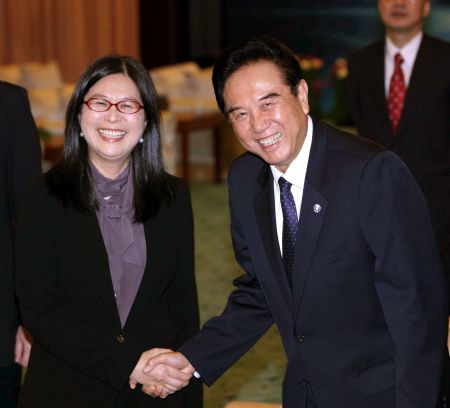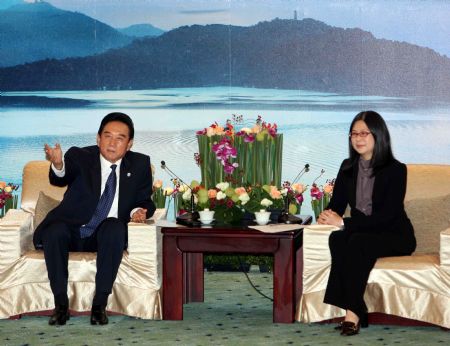
Chen Yunlin (L), president of the Chinese mainland's Association for Relations Across the Taiwan Straits (ARATS), meets with Taiwan's mainland affairs chief Lai Shin-yuan in Taichung of southeast China's Taiwan, Dec. 22, 2009. (Xinhua/Yuan Man)
TAIPEI, Dec. 22 (Xinhua) -- The past 18 months witnessed epoch-making breakthroughs and sustaining tangible improvement in relations across the Taiwan Strait thanks to negotiations between the mainland and Taiwan.
The two sides signed three pacts Tuesday at the fourth round of talks between the mainland's Association for Relations Across the Taiwan Straits (ARATS) and the Straits Exchange Foundation (SEF) in Taiwan, closely related to everyday life of farmers, fishermen and business people on both sides.
The previous three rounds of talks , which were resumed in June 2008 after 10 years' suspension, led to the long-expected direct transport and postal services, the end of a ban on mainland tourists to Taiwan and other agreements on cooperation in food safety and finance among others.
"We have done in the past one and half years what could not have been done in the past 20, 30 or even 60 years," said ARATS President Chen Yunlin, when meeting with Taiwan's mainland affairs chief Lai Shin-yuan Tuesday afternoon.
The negotiation mechanism between the two organizations had matured and the agreements had been well implemented, which had brought vitality to cross-Strait relations, Chen said.
Lai said the talks produced good results and signaled a step forward.
"The peaceful development meet the needs of people across the Strait and this path should be followed," she said.
Experts and local people in Taiwan were impressed by their effective work that removed bit by bit historical barriers between the two sides.
"We can see the talks between ARATS and SEF have covered more and more specialized issues," said Prof. Chou Jih-shine from Taiwan University.
It was a natural development as the two sides had a wider range of cooperation, he said. "New problems would turn up after old ones solved."
Prof. Pan His-tang, from Tamkang University, told Xinhua that every new agreement showed the two sides had built up mutual trust in one more field and "one more door" was opened.
The two sides did not sign an agreement on taxation cooperation at the fourth round of talks in Taichung, which was explained as a result of "technical problems" by Zheng Lizhong, ARATS executive vice president.
The negotiators had come up with a "basic" consensus on avoiding double taxation and strengthening taxation cooperation but they needed more talks on some "technical problems," said Zheng, adding the agreement would be signed in due time.
Prof. Zhu Weidong, deputy director of the Institute of Taiwan Studies under the Chinese Academy of Social Sciences, said the failure in signing such an agreement showed the talks had entered a stage of routine and pragmatic work that involved interactions back and forth.
"If there is difference, the two sides will just lay the issue aside and wait for more common understanding. This is a manner of mutual respect and good will that can sustain the talks," he said.
The two sides also agreed to kick off the negotiation on the Economic Cooperation Framework Agreement (ECFA) next year after long-term expectations and guesswork.
The pact, thought to make systematic arrangements to normalize cross-Strait economic ties and bring two economies closer, was a heated topic over the past months, especially among Taiwan business circle.
SEF Chairman Chiang Pin-kun said during the talks that Taiwan and the mainland must jointly tackle economic challenges, and the establishment of a cross-Strait economic framework "should not be delayed."
"The agreement should be signed as soon as possible. It will sharpen the competitive edge of many industries in Taiwan," Hsu Sheng-hsiung, honor director of the Taiwan Electrical and Electronic Manufacturers Association, quoted by Taiwan media.
The framework would help Taiwan business reach a broader market via the mainland, he said.
Chen promised that the mainland would consider the situation of Taiwan's economy and make "reasonable" arrangements to meet Taiwan people's concerns.
He also suggested the two sides carry on the talks at an "active but steady" pace.
"Economic issues are and will be the major topics of our talks in near future," he said, adding that the agenda would include more topics about cultural, education, media and scientific exchanges.

Chen Yunlin (L), president of the Chinese mainland's Association for Relations Across the Taiwan Straits (ARATS), meets with Taiwan's mainland affairs chief Lai Shin-yuan in Taichung of southeast China's Taiwan, Dec. 22, 2009. (Xinhua/Yuan Man)